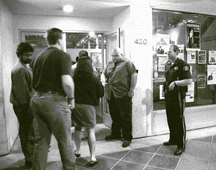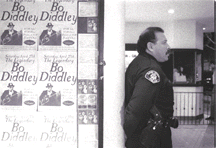Security Matters
Copping Out: On a given weekend night downtown, there are more uniformed San Jose cops moonlighting in clubs than there are on regular patrols.
Off-duty cops in uniform make impressive security guards for clubs, but should private protection come at the public's expense?
By Laura Stuchinsky
ON SATURDAY night in downtown San Jose's SoFA district, tendrils of Latin jazz and reggae seep from open doors and windows on a temperate spring night. Wearing everything from denim overalls to silk jackets, knots of prospective nightclub patrons jam the sidewalks in front of several establishments along South First Street.
Police officers are everywhere. They roll by in their black-and-white sedans, cluster on a corner to talk and sip coffee, and lean against a rail in front of a club. It's impossible to distinguish the officers on duty from those moonlighting as security guards for the clubs. That's precisely the clubs' intent.
In accordance with their city-issued entertainment permits, the nightclubs are required to hire either state-registered security guards or uniformed, off-duty police officers on their busy nights. These days, the clubs uniformly hire off-duty cops.
"People don't react the same way to a rent-a-cop as they do to a real cop," explains Fil Maresca, president of the San Jose Downtown Association and former owner of SoFA's FX nightclub. "We recognize that and we're willing to spend the extra money [to hire cops]."
The extra money amounts to $27 per hour, which, when multiplied by 20--the maximum number of off-duty hours allowed--totals out at $28,000 per year. This in addition to salaries which already rank high on the scale for police work in the state.
"No one's forcing them to hire a police officer," says Jim Tomaino, president of the Police Officers Association. "They know, why hire a middleman? Nothing is going to get done."
A witness to the Oasis brawl that left a 21-year-old man dead says off-duty cops fell down on the job.
HOWEVER, DUE to the extra money at stake or the standards of security preferred by police, some other clubs say they hear the "pop" of their arm being released from its socket.
"If you give the cops short shrift you're fucking yourself," maintains one club employee who spoke on condition of anonymity. If you don't hire police officers, he explains, you get harassed by on-duty police who want to see the contract go to trained police officers.
"It really behooves you to kiss the cops' ass," he advises. "It's essentially graft."
Accusations such as this prompted San Jose's independent police auditor, Teresa Guerrero-Daley, to study the police department's off-duty employment policy. Guerrero-Daley says the majority of the complaints her office has fielded since it opened for business in September 1993 have involved off-duty, uniformed police officers. And most of the complaints alleging excessive use of force were lodged against officers working on their own time at a bar or nightclub.
Her conclusion: the system should be overhauled.
Guerrero-Daley's report will be discussed at a public hearing on May 7 before the City Council. But as far as the San Jose Police Officers Association and a majority of San Jose's nightclub owners are concerned, the only problem is the public relations stink the auditor created when she released her report.
The Downtown Association's nightclub committee argues that the city gets a tremendous boost from the 40-50 extra officers stationed downtown on weekend evenings--paid for by the clubs.
As a result of the added police presence, the committee reasons, "violent crime, gang-related activity and nuisances are averted, and a safer downtown is enjoyed by all merchants and their patrons."
"Without a doubt, on Friday and Saturday night there's more officers working those [off-duty] jobs than working the streets," Tomaino agrees. If the city eliminated off-duty officers, he says "there's no way we could handle [the calls for service]."
But having an officer on guard is no guarantee of safety, as was recently illustrated in a high-profile incident in which 21-year-old Oakland resident Jason Scott Cooper was killed outside the Oasis nightclub following a brawl while seven hired off-duty officers were stationed outside (see related story on this page). Despite exceptions such as this, club owners still believe that police officers serve as a stronger deterrent to troublemakers. But according to other law enforcement officers and civil-rights groups, there are hidden costs.
APPROXIMATELY HALF of SJPD's 1,214 police officers moonlight--considerably more than the 20 percent typically considered high at most departments, says California State University, Hayward criminal justice professor Marc Neithercutt. But more significantly, most of San Jose's officers who work off duty--59 percent--wear their uniform performing some kind of security service, whether at a high school dance, a fast-food restaurant or a nightclub.
"Wow," escaped the lips of one Bay Area deputy police chief upon hearing San Jose's stance on uniformed security officers.
Many Bay Area law enforcement agencies allow their officers to work security detail when they're off duty. But according to a poll conducted by the SJPD, San Jose is one of only two cities its size that allows its officers to do so in uniform for nightclubs. In fact, the question of uniform or no uniform is a topic of hot debate among law enforcement professionals nationally.
Some local agencies go a step further and prohibit their officers from working at establishments that sell liquor. And then there are those, like the Berkeley Police Department, that prohibit officers from working off duty as security officers at any location--in or out of uniform.
The reasons they offer are the same raised by Guerrero-Daley in her report: public perception and a conflict of interest.
When an officer is working for the private sector, "it becomes a potential conflict of interest which laws to enforce," explains Commander Don Olsen of the Sunnyvale Police Department, which prohibits its officers from working as private security guards for bars and nightclubs.
"The basic question that has to be answered is what is being provided for the money paid?" asks Olsen. "Are they [acting] as sworn police officers upholding state law, or are they enforcing the rules of the business?"
Guerrero-Daley says that's precisely the question some San Jose police officers admitted finding themselves wrestling with while working for the city's nightclubs. As sworn officers of the peace, cops are bound to uphold laws that prohibit minors from drinking and impose strict occupancy limits on businesses. But enforcing laws such as these could put an officer in conflict with his or her off-duty employer. As a result, Guerrero-Daley says, officers sometimes are tempted to look the other way when it comes to such infractions.
"I'm sorry--that's a bunch of bull," charges Tomaino of the Police Officers Association. "Your first obligation is as a police officer. If you did anything to violate the law, the chief would fire you."
"I can't say that it doesn't occur," Tomaino continues. "But if it does, that officer deserves to be disciplined."
STILL, THE fact that the San Jose officers wear their uniform while they're working off duty seems to complicate matters significantly.
According to Guerrero-Daley, residents frequently complain about the police department's slow or failure to respond to non-emergency calls. Their anger is intensified when they see officers standing idly outside clubs. The fact that most of the clubs pay their off-duty officers with cash could also be misconstrued by members of the public, Guerrero-Daley notes.
"She's right," says Hayward's Neithercutt. "It opens up all kinds of opportunities for graft."
"It looks like more of a problem than it is," counters Maresca, who is now a consultant to downtown businesses, including Metro and several SoFA nightclubs. "The perception is that the officers are being slipped money under the table. They're not. We 1099 them," he notes, referring to the IRS wage form issued by employers.
In fact, the nightclub committee has offered to provide the city with quarterly reports documenting the number of hours and pay each officer receives. But the cash-based businesses would prefer to continue paying their officers in greenbacks.
That's disconcerting to at least one police officer who regularly works security at a SoFA club. "I would be worried," he says, if he were a citizen witnessing the money change hands. Anticipating a negative reaction from his peers, the officer asked not to be identified.
"I completely understand where citizens are coming from," says Tomaino. "Public perception, that's a tough one. But if you take the officer out of their uniform, you take away the psychological effect."
John Crew, director of the Police Practices Project of the ACLU of Northern California, counters, "Don't tell me that they're police officers unless I have equal right to them. If they're not part of the pool of available officers, then they're not on duty. They can't have it both ways."
Crew says he doesn't doubt that police officers are more effective than security officers. But he says the consequences of officers appearing to be on-duty and available when they're not also have to be considered.
"The public gives the police unique powers to deprive us of our freedom and to use force. The uniform and badge are the visual symbols of those powers. Those symbols shouldn't be displayed unless police officers are on duty and using those powers for all, not just on behalf of those able to pay."
Nightclubs should be held responsible for their own security, Crew argues, even if they have to hire twice the number of security guards to achieve the same level of safety they have with off-duty officers.
Sunnyvale's Don Olsen agrees.
"Having a business that requires armed, uniformed [officers] of the state, what kind of business is it that needs that level of interdiction?" he asks.
ALTHOUGH OLSEN sees a number of practical reasons why San Jose might want to revamp its off-duty employment practices--including questions of legal liability--he acknowledges that changing the policy would be difficult politically.
When you change "something that has been going on for some time, you're going to bite into [some officers'] way of living," he notes. "They're gonna be upset."
Some off-duty officers interviewed on a recent weekend said they wouldn't care if the department turned off the spigot on off-duty work. But they said that they knew others who would protest.
"Some officers are going to be hurt," said one off-duty regular. "Everyone gets used to living a certain lifestyle and getting a certain amount of money."
Police Chief Lou Cobarruviaz has declined to respond publicly to the auditor's report before the May 7 council meeting, but there are hints that the department is considering some changes.
Still, Crew is skeptical of the outcome, given how little power the auditor has and how few of her recommendations have been followed thus far.
"Especially on a recommendation that's this controversial, unless there's some real follow-up by someone other than the police, I'll take bets right now that nothing significant is going to change."
[ Metro | Metroactive Central | Archives ]

Christopher Gardner



